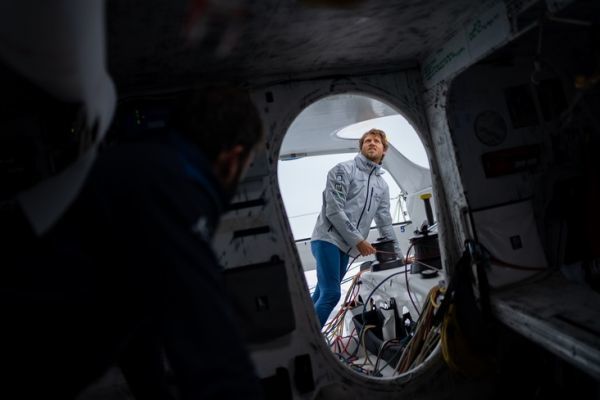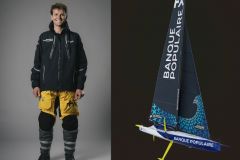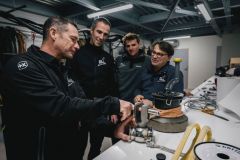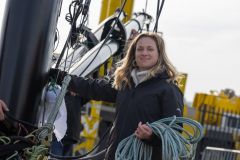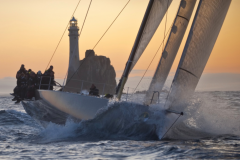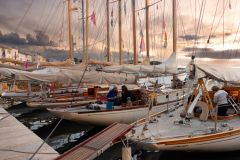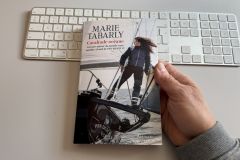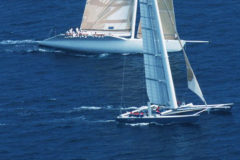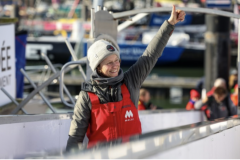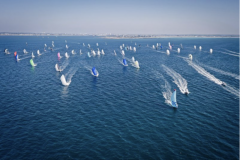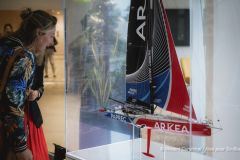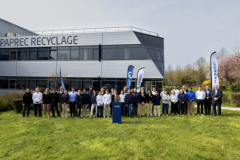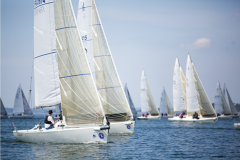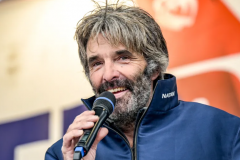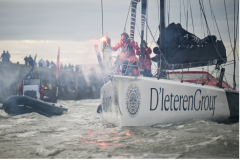You switched from Mini to IMOCA after your 3rd place in the Mini 2019, how do you explain this big move?
I've tripled the size of the boat! I thought I'd stop ocean racing after the Mini. That podium finish changed everything. But it was meeting Jean Le Cam that really accelerated things. I'd known Jean for a few years. He'd followed my career. I had dinner with him three months after the Mini, and he started to plant the seed in my head of preparing for the Vendée Globe. For me, it was totally out of reach. I didn't come from an ocean racing background. But having someone who's done five of them, and who makes you believe you're capable of doing one, changes the whole thing. He gave me a lot of confidence, helped me find the boat, get the sponsor together... In the end, I have to say he was right. I'm having a lot of fun with it, and what's more, I've had some great results over the last two years.
That's how I ended up on an 18m boat after the Mini.
Where do you look for advice and experience when you're new to a new medium? Did you rely solely on Jean Le Cam?
The whole project was based on intergenerational transmission. It made sense with the relationship I have with Jean, the sponsors and the association I'm promoting, which defends intergenerational relations. I got my experience where it was. Firstly, from people who knew me well, who knew where I'd come from and the road I had to travel, like Tanguy Leglatin, who saw me sail my first Mini, but also from other skippers who'd been there. I also called on skippers with whom I get on well and who were also beginners like me. I'm thinking in particular of Guirec (Soudée). We come from more or less the same universe, the adventure and exploration side. We were both starting the project from scratch. He got advice from Bilou, I got advice from Jean. We had parallel paths, each with old hands who took us under their wings. It was also by exchanging ideas with others that I built myself.
After that, when you're all alone at sea, you have no choice.
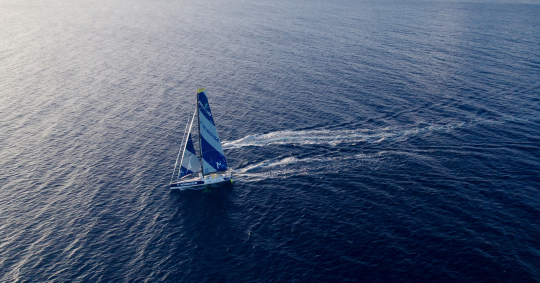
Even though you have a daggerboard boat, you put in some fine performances. How do you explain this?
I'm in the right place. I'm not expected anywhere. When I don't do well, they don't expect me to. When I do, it stands out because I've got an old-generation boat, but it's a great boat. I always say: the happier you are, the faster you go, and I'm really too good at sea. I'm like a kid being teleported back to the Vendée Globe, with all those skippers, sailors and great races. I think I'm enjoying every moment of it, including the difficult ones at sea. Of course it's not easy, there are moments that aren't easy.
But it's my first time, and first times are always intense. I give it my all. Maybe that's why, sometimes, there are good results at the finish.
Was the choice of this boat more of a financial one, or a safety choice to gain experience?
The story is quite pretty. It was this boat that made me dream. I remember that even before I started ocean racing, there was the start of the Route du Rhum in Saint-Malo. I'm from Saint-Malo. Some friends and I rented a small Zodiac and we were the last to leave the IMOCA Macif at the time of Gabart. That was the boat. I still have the photo on my parents' fridge where you can see a tiny Zodiac behind the IMOCA. I'd been chasing that boat for a few years, and today it's mine. It was the perfect boat for this kind of project. It was reliable, it had already sailed around the world, and it was easy to handle and operate. It was perfect for my first Vendée Globe, ticking all the boxes.
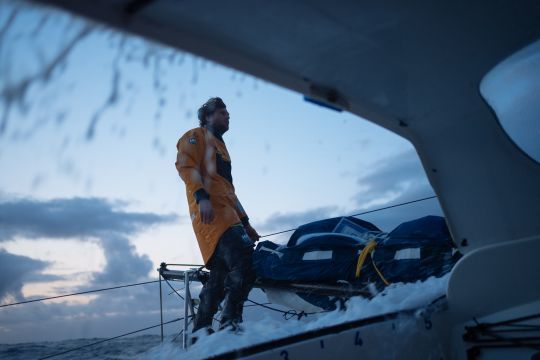
What is your objective for this first Vendée Globe?
It's about finishing. We're always asked about rankings, daggerboard boats... Of course there's competition. When I'm on the boat, I'm a huge competitor. More so than I ever imagined. I've discovered that side of myself. I always want to go faster than the others. But for me, the story will be beautiful if it comes full circle. Above all, I find it rather difficult to set targets for results when you know how random everything is. For me, the goal isn't a ranking, just to come full circle having given my all and having zero regrets about the whole race. And if that's the case, there's bound to be a result at the finish.
Apart from the result, what are your hopes and fears?
My biggest fear, really, is not finishing. That's what gets me. I watch the races in progress, and to see that there are sailors banging on, who can't finish, that's what really scares me. Not coming full circle. On the other hand, what really excites me is going to places where no one else has been. I think it's magical to be an explorer. And I miss it. I realize that when I'm ashore, the sensations I get at sea, making decisions for yourself, being connected to who you are, are very intrinsic. I love it. To go and experience that - I experienced it over twenty days - around the world for three months, those are sensations I want to experience.
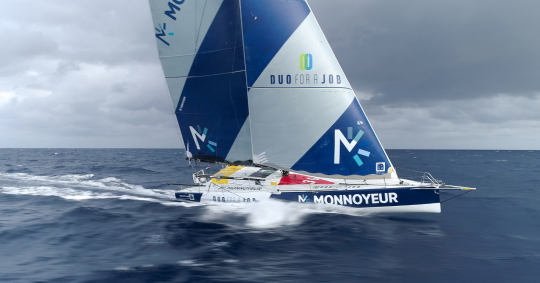
So the Vendée Globe is still an adventure?
Yes, completely. More than ever. The magic of competition is that it allows you to go after things you wouldn't have gone after without it. You discover resources that are incredible. The thrill is in the adventure. On the trajectories around the world, you pass through completely unexplored regions, sometimes going to repair under an island. That's the magic of it. I think that's what makes people dream. I think that's our role.
The theme of the conference was ecology and the environment (Editor's note: this was an event organized by the Vendée Globe organizers), but I think our role is just to make people dream about the planet. If we can make people love the planet, they'll want to protect it. It's pretty simple and basic.
How do you plan to manage your environmental impact on the race?
Obviously, building new carbon boats has an impact on the environment, on the planet. Today, we sail around the world, and we're lucky enough to do it under sail. We're conveying a very healthy image. There are plenty of areas for improvement in the projects, but I'm more one of those people who want to do things without making a big deal of it and communicating. I heard what was said at the conference, and I think it's great. But from my point of view, it's very personal, I think it's the basis. You have to do all that, measure your carbon impact, deal with waste on construction sites... These are things we do, but we don't want to communicate about them, because it's the basics.
On the other hand, once again, the only impact we can have is to make the planet pretty, to make people dream and to make them want to protect it. That's why I want to protect the planet. We're constantly told that it's fragile. We intellectualize it a lot when we're on land. When you're out at sea, you experience it, you feel this fragility, you feel that you're fragile in the face of this element. That's what makes me want to protect it. Just as Thomas Pesquet in the ISS sees this fragility. Testifying to that and talking about that fragility is the best way to raise awareness of conservation.
